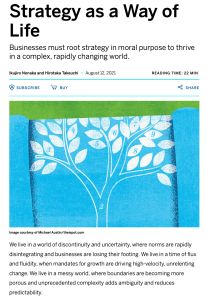Join getAbstract to access the summary!

Join getAbstract to access the summary!
Ikujiro Nonaka and Hirotaka Takeuchi
Strategy as a Way of Life
Businesses must root strategy in moral purpose to thrive in a complex, rapidly changing world.
MIT Sloan Management Review, 2021
What's inside?
Base your company’s strategy on a set of lived values to thrive in a competitive 21st-century business environment.
Recommendation
A rapidly transforming business environment requires new approaches to strategic thinking. When facing an unpredictable future, organizations are better served by a compass, rather than a detailed road map, argue Japanese academics Ikujiro Nonaka and Hirotaka Takeuchi in one of MIT Sloan Management Review’s most popular articles of 2021. Drawing on ancient Japanese teachings about collective responsibility and righteous living, the authors explain how to base strategy on a set of lived values to thrive in a competitive 21st-century business environment.
Summary
About the Authors
Ikujiro Nonaka is professor emeritus at Hitotsubashi University. Hirotaka Takeuchi is a professor of management practice at Harvard Business School.





















Comment on this summary